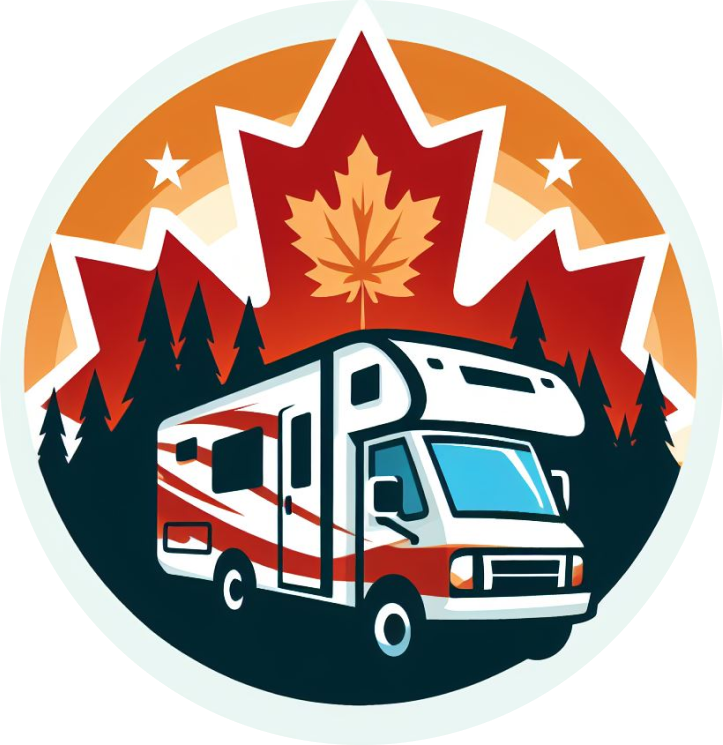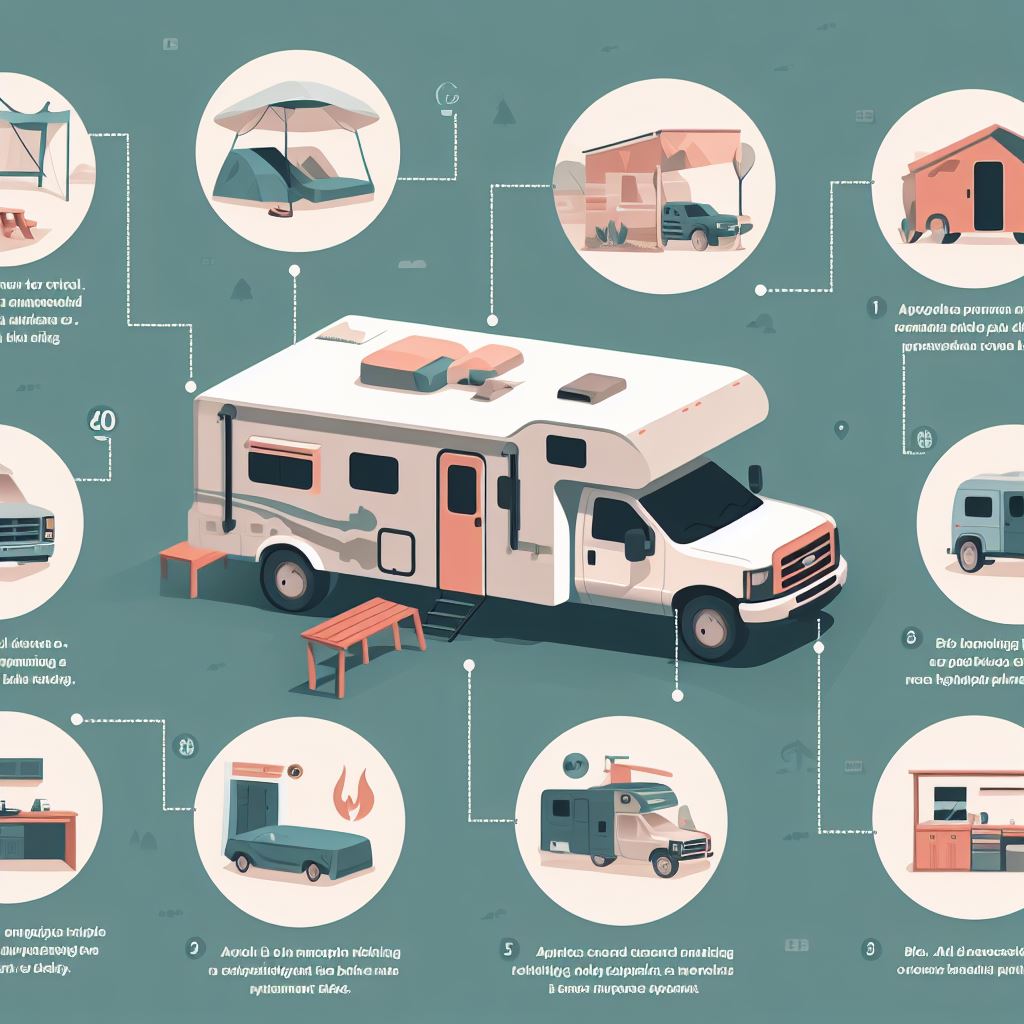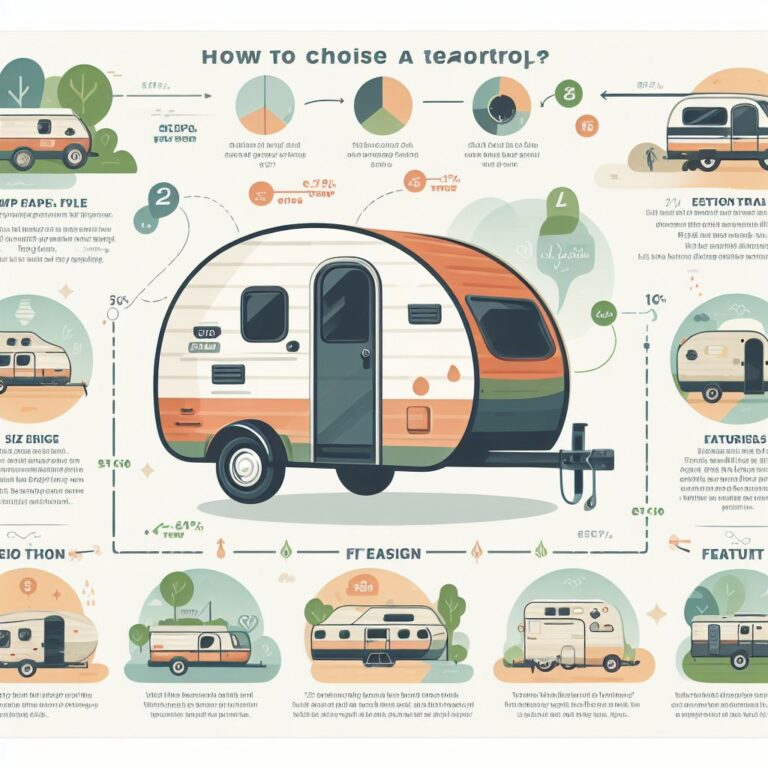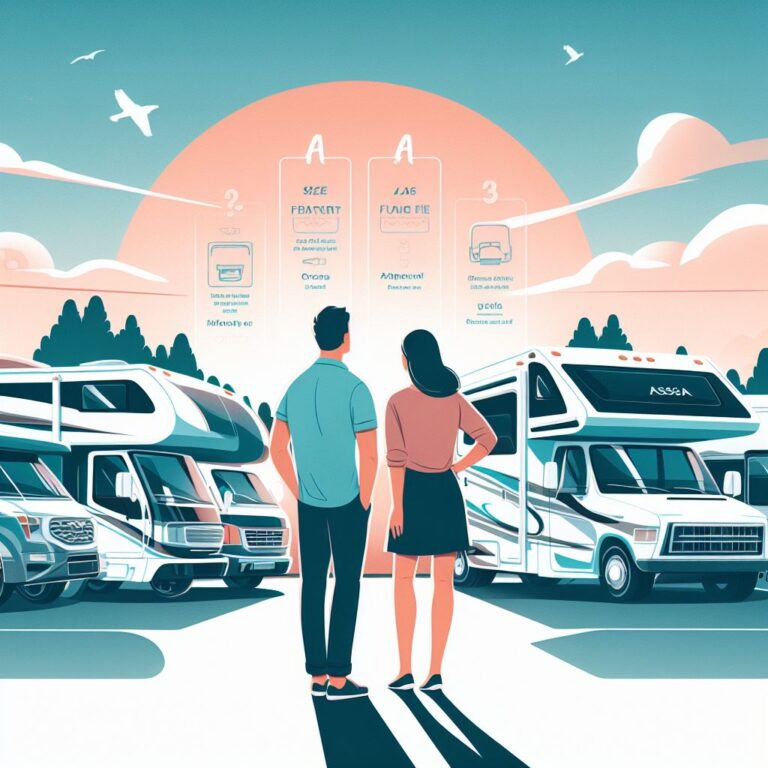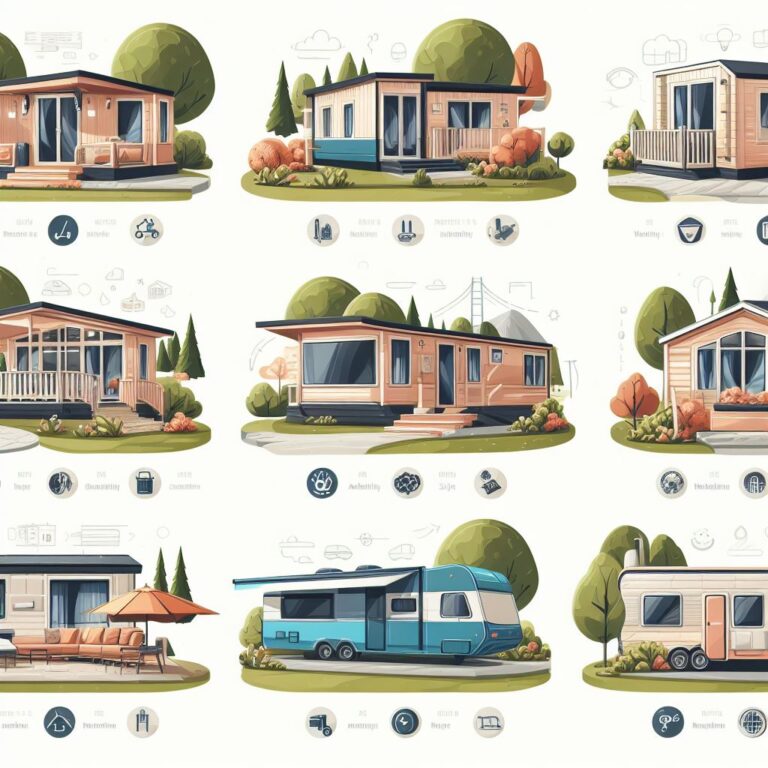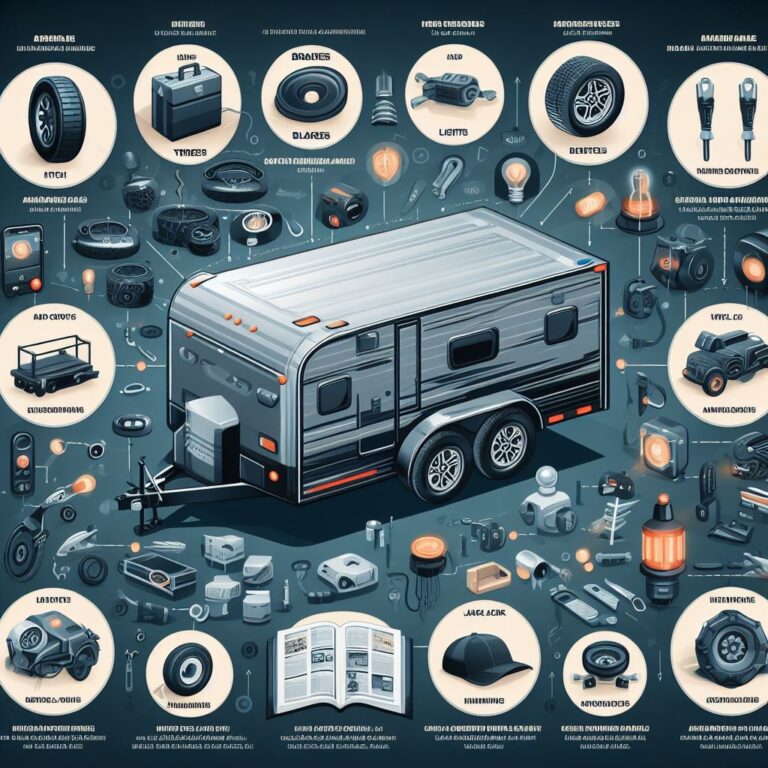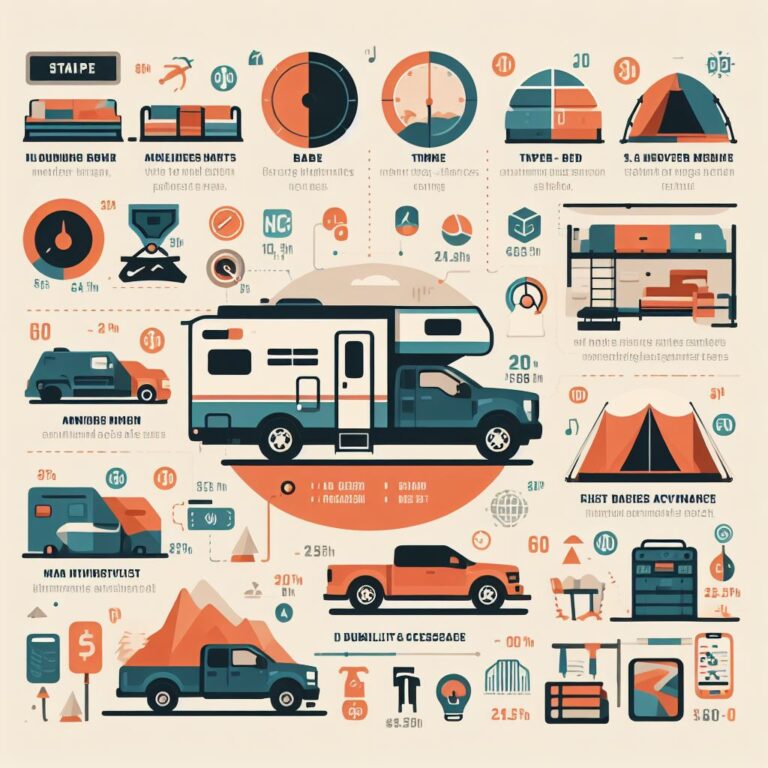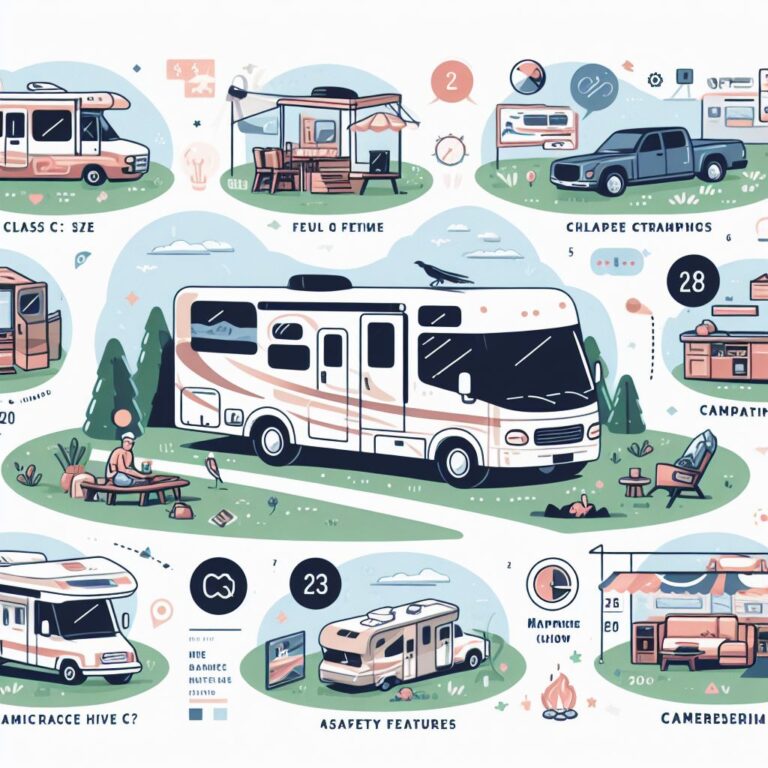How To Choose Class C Motorhome $100,000 – $200,000 Sleeps up to 8 6.4 to10.7 M(21-35 FT)
Understanding Different Types of Motorhomes
Motorhomes epitomize comfort on the move. Being a type of recreational vehicle (RV), motorhomes are designed to offer a homely experience while on the go. Different types of motorhomes are on the market today, each having its distinction that sets it apart.
Class A motorhomes are typically the largest and most luxurious of the motorhome family. They offer ample space to sleep, cook and relax, making extended vacations comfortable. On the other hand, Class B motorhomes, also known as camper vans, offer convenience. Compact yet fully equipped with essentials. Class C motorhomes offer a mix of Class A’s space and Class B’s agility, making it an ideal family RV. These differences are essential to understand as they dictate which type will fit a prospective owner’s needs in regard to cost, size, and functionality.
• Class A Motorhomes: These are the largest and most luxurious type of motorhomes. They typically include multiple bedrooms, a full kitchen, bathroom facilities, living area and often additional amenities such as washer/dryer units or outdoor entertainment systems. Their size makes them ideal for extended vacations or full-time RV living.
• Class B Motorhomes (Camper Vans): These are the smallest class of motorhome but don’t let their compact size fool you. Despite being small in stature, they’re fully equipped with all essential features including a sleeping area, kitchenette and bathroom facilities. Their smaller size also makes them easier to drive and park than their larger counterparts.
• Class C Motorhomes: This category offers a perfect blend between Classes A and B. While not as large as Class A motorhomes, they offer more space than camper vans along with many similar amenities found in larger models. They usually feature an over-cab sleeping area which adds to their overall capacity without extending the vehicle’s footprint.
In addition to these three main types of motorhomes there are also specialty categories:
• Fifth-Wheel Trailers: These require a pickup truck for towing but offer spacious interiors complete with master suites and high ceilings.
• Toy Haulers: As the name suggests these RVs come with built-in garages designed to transport ATVs, motorcycles or other “toys”.
Understanding these differences can help prospective owners make informed decisions when purchasing a new motorhome based on factors such as cost-effectiveness, required driving skill level, storage needs and lifestyle preferences.
Establishing Your Budget Range
In the process of buying a motorhome, one of the initial steps is getting a clear understanding of your financial capacity. It involves a careful evaluation of your finances and recognizing what you can afford without overstretching your budget. This step calls for creating a budget range that will guide your spending decision during your motorhome purchase. The budget you set should be comprehensive, and should consider not only the upfront cost of the motorhome but also ongoing costs such as maintenance, insurance, fuel, and potential campground fees.
Coming up with a realistic budget will not only narrow down your options but will also prevent future financial strains. To formulate a viable budget, assess your income against your monthly expenses, obligations and savings. You must also consider how you plan to use the motorhome – whether it will be used sparingly for short road trips or frequently for full time living – as this will influence maintenance and operating costs. Additionally, it is important to remember that just like cars and homes, motorhomes can attract financing, leasing or loaning options. Consider these channels if your current finances cannot afford you an outright purchase. Overall, the rule of thumb is to always stay within your financial means.
To ensure that you establish a realistic budget, follow these steps:
• Evaluate your financial capacity: This involves taking an in-depth look at your finances to determine what you can afford without straining your budget. Consider all sources of income and how stable they are.
• Assess expenses against income: List down all monthly expenses and obligations such as rent or mortgage payments, utility bills, groceries, insurance premiums etc., and compare them with your total monthly income.
• Take into account savings goals: Don’t forget about any short-term or long-term saving goals you may have. Your motorhome purchase should not derail other important financial objectives.
• Factor in the usage of the motorhome: If you plan on using it for full-time living, maintenance costs will be higher compared to occasional road trips.
• Consider ongoing costs: The cost of owning a motorhome doesn’t end after purchasing it. You must also consider ongoing costs like maintenance fees, insurance premiums, fuel charges and potential campground fees when establishing your budget range.
• Look into financing options: If paying upfront is not feasible for you at present, explore various loaning or leasing options available in the market. Always remember to read through their terms and conditions carefully before making a commitment.
By following these steps diligently while remaining within your means financially will help you establish a comprehensive budget range for buying a motorhome.
Assessing Your Space Requirements
Firstly, it’s crucial to consider the living and storage spaces inside the motorhome. Opt for a model that can comfortably accommodate everyone who will be traveling in it; remember comfort is the key factor, especially for long drives or stays. Furthermore, you need to assess the storage capacity suitable for your specific needs, such as cabinets, closets, and under-bed storage. Keeping in mind the items you plan to bring on your trips, including cooking utensils, clothing, personal items, outdoor gear, and any other must-haves, is critical while making your choice.
Secondly, you should consider the size of the communal areas — the dining, pantry, and relaxation areas. This will primarily depend on how many people you’re planning to house in the motorhome and how you like to spend your time. For instance, if you often host friends or love indoor activities, a model with ample indoor common space might be the most desirable choice. As such, clear definitions around your space requirements can certainly help in narrowing down your options.
• Firstly, consider the living and storage spaces inside the motorhome. This includes areas such as cabinets, closets, and under-bed storage.
• Opt for a model that can comfortably accommodate everyone who will be traveling in it; remember comfort is key especially for long drives or stays.
• Assess the storage capacity suitable for your specific needs.
• Keep in mind all items you plan to bring on your trips including cooking utensils, clothing, personal items, outdoor gear and any other must-haves.
• Secondly, think about the size of communal areas — dining area, pantry space and relaxation zones.
• The choice here primarily depends on how many people you’re planning to house in the motorhome.
• Consider how you like to spend your time – if hosting friends or indoor activities are common occurrences then a model with ample indoor common space might be desirable.
In conclusion:
• Clear definitions around your space requirements can help narrow down options.
• Always keep comfort at forefront when making choices regarding layout and design of interior spaces within a motorhome.
Determining the Ideal Length for Your Motorhome
When it comes to choosing the perfect motorhome for your needs, size certainly matters. The length of your prospective RV is not a factor to be overlooked, as it directly impacts your ease of navigation, the amount of living and storage space, as well as the types of campgrounds or parks which can accommodate your vehicle. For instance, a smaller-sized motorhome can provide greater mobility, perfect for winding roads or smaller camping sites, whereas larger models offer increased living space, ideal for more extended stays or larger families.
Reliability and comfort should not be compromised by the physical dimensions of your motorhome. Before making a purchase, consider your intended use, whether it’s for weekend getaways or full-time occupancy, and also factor in the number of occupants. Thinking about your destination choices is also crucial; some roads or campgrounds have restrictions on the size of vehicles. Remember, the ideal length of your motorhome is not a default number; it’s a balance of mobility, comfort, and usage.
The following are some points to consider when determining the ideal length for your motorhome:
• ● Consider Your Usage: If you plan on using your motorhome for weekend getaways or short trips, a smaller size may be more suitable. On the other hand, if you intend to live in it full-time or have larger families, a bigger model with more living space would be beneficial.
• ● Number of Occupants: The number of people who will regularly use the motorhome is another crucial factor. A family of four will need considerably more space than a couple.
• ● Destination Restrictions: Keep in mind that some campgrounds and parks have restrictions on vehicle size. Make sure your chosen RV can comfortably fit into most sites where you plan to travel.
• ● Mobility vs Space: Smaller motorhomes offer greater mobility and ease of navigation, especially on winding roads or tight camping spots. Larger models provide increased living and storage space but might not be as easy to maneuver.
• ● Storage Needs: Think about how much storage space you’ll need. Will you carry bikes, kayaks, grills or other large items? These require additional room which must be considered in choosing an RV’s size.
In conclusion, there’s no one-size-fits-all answer when it comes to choosing the perfect length for your motorhome; it largely depends on individual needs and preferences. It’s essential to strike a balance between comfort, mobility and usage requirements before making this significant investment.
Factors to Consider When Buying a Motorhome
Purchasing a motorhome is a significant investment and to ensure you’re making the right decision, a number of factors need to be taken into account. As with any automobile purchase, value and quality for the price are primary considerations. It’s important to select a model from a reputable manufacturer and conduct a thorough research to enlighten you on potential mechanical issues associated the model. Look out for features that are important to you such as storage, living and kitchen areas.
In addition to the model of the motorhome, determining the ideal size is also crucial. This depends largely on the number of people it needs to accommodate, and the level of comfort you desire. If you plan to travel frequently and for extended durations, a larger, more comfortable motorhome may suit better. Consider where you plan to drive, as the local terrain and road conditions can also influence the size or model you decide on. Moreover, always keep in mind the operating costs, such as fuel efficiency and maintenance, to prevent any future financial surprise.
In summary, here are some key factors to consider when buying a motorhome:
• Reputation of the Manufacturer: Always opt for a model from a reputable manufacturer. Research thoroughly about any potential mechanical issues associated with the model.
• Value and Quality: Ensure that you’re getting value for your money. The quality of the motorhome should be commensurate to its price.
• Features: Look out for features that are important to you such as storage space, living area and kitchen facilities. The more customised these features are towards your needs, the better it would suit you during travel.
• Size of Motorhome: Determine what size is ideal depending on how many people will be using it and how much comfort level you desire. If frequent travel or long trips are planned, then a larger motorhome might be more suitable.
• Driving Terrain and Road Conditions: Consider where you plan to drive most frequently – whether in city roads, highways or off-roads. This can influence which size or model would best fit your requirements.
• Operating Costs: Be aware of operating costs like fuel efficiency and maintenance expenses. These recurring costs can add up over time so understanding them beforehand helps prevent future financial surprises.
Remember that purchasing a motorhome is an investment not only in terms of money but also in lifestyle change – it’s all about finding the right balance between comfort, cost-effectiveness, functionality and suitability according to individual needs/preferences.
Finding the Right Motorhome Within Your Price Range
When it comes to purchasing a motorhome, it’s crucial to consider your budget range. Establishing a firm financial plan can guide you towards the models and features that are financially accessible for you. Prior to beginning your search, set a clear and realistic budget, remembering to account for additional costs such as insurance, maintenance, and fuel. You’ll find that motorhomes can vary greatly in price, ranging from basic, budget-friendly models to extravagant, luxury designs.
In the context of Canadian prices, used trailers and class B motorhomes can start under $10,000, while large, new class A motorhomes can exceed $200,000. Conduct extensive market research to ascertain what you can expect to get within your price range. Many online platforms provide handy tools, like lowest to highest price filters, to help narrow down your search efficiently. Additionally, consider reaching out to local dealerships as they often have special deals or financing options. Remember, acquiring the right motorhome isn’t about selecting the priciest model, but finding a model that enhances your traveling life without depleting your finances.
To help you find the right motorhome within your price range, follow these steps:
• Determine Your Budget: Before starting your search for a motorhome, it’s essential to establish a clear and realistic budget. Make sure to account for additional costs such as insurance, maintenance, and fuel.
• Understand Price Variations: Motorhomes can vary greatly in price. Basic models may be more affordable but come with fewer features while luxury designs offer numerous amenities at a higher cost.
• Conduct Market Research: This step is crucial in understanding what you can expect within your budget range. Look into different types of motorhomes like used trailers or class B units which start under $10,000 or large new class A models that exceed $200,000.
• Utilize Online Tools: Many online platforms provide tools that allow you to filter prices from lowest to highest. These resources can help narrow down options based on your financial plan.
• Reach Out To Local Dealerships: Local dealerships often have special deals or financing options available. They also provide an opportunity for you to physically inspect potential purchases before making any decisions.
Remember that finding the right motorhome isn’t about selecting the most expensive model; it’s about choosing one that enhances your traveling life without draining your finances.
In conclusion:
– Stay within Your Budget
– Use Available Resources
– Don’t Overlook Used Models
– Consider Additional Costs
– Talk with Experts
The Significance of Sleeping Capacity in Motorhomes
When embarking on a journey of exploring the great outdoors with a motorhome, the sleeping capacity becomes an integral factor to ponder upon. Underestimating the importance of this feature could lead to cramped and uncomfortable journeys, thus detracting from the overall enjoyment of your trips. As a rule of thumb, one should ensure that the chosen motorhome can comfortably accommodate one more person than the number of people who plan to use it regularly. This allows for added comfort and space and comes in handy if an additional guest decides to join in on the adventure.
Motorhomes with a greater sleeping capacity do not only offer extra sleeping space but often come with added amenities designed to make the travel experience more enjoyable. These may include larger dining areas, increased storage space, or even additional bathroom facilities. Long trips or full-time living conditions necessitate larger sleeping capacities. Therefore, before you finalize your motorhome purchase, ensure to assess the sleeping capacity in relation to your specific needs and desires. Doing so will greatly enhance the comfort, convenience, and ultimate enjoyment of your traveling experiences.
Here are some of the key reasons why considering sleeping capacity in motorhomes is crucial:
• Comfort: A motorhome with a larger sleeping capacity ensures that all passengers have enough space to sleep comfortably. Cramped spaces can lead to restless nights and, consequently, tiresome days.
• Additional Amenities: Motorhomes designed for more people often come equipped with additional amenities such as larger dining areas or extra bathroom facilities. These features make your journey more enjoyable and convenient.
• Flexibility: Sometimes, you may decide to invite an extra guest on your trip or one of the family members might bring along a friend unexpectedly. In such cases, having an extra bed becomes a blessing.
• Storage Space: Larger motorhomes usually offer increased storage space which allows you to carry all necessary items without worrying about cluttering living areas.
• Full-time Living Conditions: If you plan on using your motorhome as a full-time residence or for extended trips, then opting for one with higher sleeping capacity would be beneficial due to the added comfort it provides over longer periods.
In conclusion, while choosing a motorhome based solely on its aesthetic appeal could be tempting; remembering practical considerations like sleeping capacity will ensure that your investment pays off in terms of enhanced comfort and convenience during travels.
The Benefits of Owning a Motorhome That Can Accommodate Up to Eight People
Families and groups of friends find that larger motorhomes have the most significant appeal. The opportunity to experience getaways without sacrificing comfort or space is a significant consideration for these demographic groups. Motorhomes that can accommodate up to eight people often come with ample space for living, sleeping, and storage. They can accommodate larger parties without feeling cramped, and everyone has their dedicated space, which often translates into a more enjoyable traveling experience.
An often overlooked advantage of spacious motorhomes is the possibility of cost-sharing. Larger groups traveling together often split expenses, making trips considerably more affordable. Furthermore, a larger motorhome mirrors the comfort of a mobile home. They provide basic amenities such as a sizeable kitchen, bathrooms, entertainment systems, and even lounging areas. For intrepid travelers seeking the perfect balance between adventure and comfort, a large motorhome seems like the ideal choice. They make for memorable travel experiences, fostering stronger bonds among families and friends while discovering new places.
• Owning a motorhome that can accommodate up to eight people offers several benefits. One of the primary advantages is the ample space available. These larger motorhomes provide enough room for living, sleeping, and storage without feeling cramped.
• Everyone traveling has their dedicated space, which often translates into a more enjoyable travel experience. This personal area allows each traveler to have some privacy and comfort while on the road.
• Another significant advantage of owning a large motorhome is cost-sharing opportunities. When traveling in groups or with families, expenses such as fuel costs, tolls, parking fees can be divided among all members making trips considerably more affordable than individual travels.
• Large motorhomes also offer home-like comfort during travel. They are equipped with basic amenities like sizeable kitchens allowing travelers to cook meals according to their preferences; spacious bathrooms providing convenience; entertainment systems ensuring fun-filled journeys; and lounging areas offering comfortable spaces for relaxation after long drives.
• For those seeking adventure without compromising comfort, these large capacity motorhomes seem like an ideal choice. They offer the perfect balance between exploration and luxury by providing numerous facilities within a mobile unit.
• Lastly, traveling together in such spacious vehicles helps foster stronger bonds among family members or friends. It encourages group activities and shared experiences that lead to unforgettable memories made along the journey while discovering new places together.
In conclusion, owning an 8-person capacity motorhome offers various advantages from cost-effectiveness to enhanced bonding experiences among travellers. It ensures memorable journeys filled with comfort just like being at home but on wheels exploring different destinations at your own pace!
Analyzing Different Models of Motorhomes within Specified Dimensions
In the vast world of motorhomes, size does matter, both in terms of length and width. Various dimensions not only influence internal space but also maneuverability and parking convenience. These factors, subsequently, speak directly to your ultimate satisfaction and ease of handling on the highways, campgrounds, and when tucked away in storage. Motorhomes models range broadly from compact, narrow bodies to expansive full-sized versions, each with a unique set of pros and cons. It is essential to consider all these aspects to find a model that matches your exact needs and preferences.
Efficient utilization of space is at the heart of motorhome design. Compact models, generally, offer cozy living spaces which ingeniously incorporate all necessary facilities in a small footprint. These models are an excellent choice for solo travelers or small families, offering greater fuel efficiency and easy parking capabilities. On the other hand, larger motorhomes promise more comfort, more room for onboard facilities, and can cater to bigger families or groups. Understanding the preciseness of the essential dimensions and the trade-offs involved with different models turns your motorhome buying journey into a more informed decision. This, in turn, guarantees not only the value for your money but also a delightful ownership experience.
To further delve into the subject, let’s analyze a few different models of motorhomes and their respective dimensions:
• Compact Motorhome Models: These typically measure between 16 to 24 feet in length and around 7 feet in width. They offer:
– Efficient utilization of space with integrated facilities.
– Greater fuel efficiency due to smaller size.
– Easier parking capabilities even in tight spaces.
• Mid-size Motorhome Models: These are generally larger than compact models, measuring between 25 to 35 feet long and approximately 8 feet wide. They provide:
– More spacious living areas compared to compact models.
– Better balance between comfort and maneuverability.
– Suitable for medium-sized families or groups.
• Full-size Motorhome Models: The largest among all types, these motorhomes can be as long as 40+ feet with widths stretching up to about 10 feet. Their features include:
– Luxurious interior spaces with multiple onboard facilities such as full bathrooms and large kitchens.
– Accommodation for larger families or groups comfortably.
– However, they may pose challenges regarding maneuverability and parking convenience due to their expansive size.
In conclusion, understanding the dimensions of various motorhome models is crucial when deciding on which one suits your needs best. Whether you prioritize compactness for ease of travel or spaciousness for comfort during extended stays, there’s a model out there that will meet your specific requirements.
Tips for Making the Final Decision on Your Motorhome Purchase
Purchasing a motorhome is a significant decision that requires careful consideration and research. Always keep in mind that your chosen motorhome should ideally reflect your lifestyle, fit within your budget, and meet all your travel and accommodation needs. It’s essential to have a clear perspective about what you want and need, and to verify that the motorhome you’re considering ticks all the right boxes.
Don’t hesitate to ask detailed questions from dealers and private owners – knowledge is power. Understanding the maintenance history, overall condition, and any potential issues are crucial. Moreover, consider seeking professional advice or hiring a qualified inspector to spot possible problems not visible to an untrained eye. Lastly, before signing the purchase agreement, ensure to understand all the terms and conditions associated with the sale.
Here are some tips to help you make the final decision on your motorhome purchase:
• Identify Your Needs: Before you start looking at different models, spend some time thinking about how you plan to use your motorhome. Are you planning long cross-country trips or short weekend getaways? Will it be used year-round or only during certain seasons? The answers will guide your choice.
• Set a Budget: Decide what amount of money you’re willing and able to invest in a motorhome. Remember that aside from the initial cost, there are ongoing expenses like insurance, maintenance, fuel and camping fees.
• Do Thorough Research: Spend ample time researching various makes and models online. Read reviews from other owners and consider their experiences with reliability, comfort and overall satisfaction.
• Check Maintenance History: Ask for service records if buying used. This can give insight into how well the vehicle has been maintained over its lifetime.
• Get It Inspected: If possible, have a professional inspector check out the vehicle before making any decisions. They can spot potential issues that may not be visible to an untrained eye.
• Understand the Terms of Sale: Make sure all terms and conditions associated with the sale are clear before signing anything. This includes warranty information, return policies (if applicable), delivery details etc.
Remember that purchasing a motorhome is not just about choosing a vehicle; it’s also about selecting a lifestyle. Take your time in making this significant decision – don’t rush it!
What are the different types of motorhomes?
Motorhomes are classified into three main types: Class
How important is it to establish my budget range before purchasing a motorhome?
It’s crucial to understand your budget range before purchasing a motorhome. This will help you narrow down your options and prevent overspending.
How can I assess my space requirements for a motorhome?
You need to consider the number of people who will be using the motorhome, the amount of time you plan to spend in it, and what activities you intend to do. This will help determine the amount of space you require.
How do I determine the ideal length for my motorhome?
The ideal length of your motorhome depends on your travel plans, the number of occupants, and your comfort level. It is important to remember that longer motorhomes provide more living space but can be challenging to maneuver.
What factors should I consider when buying a motorhome?
When buying a motorhome, you should consider the price, size, layout, fuel efficiency, and maintenance costs. It’s also essential to consider the motorhome’s handling and performance.
How can I find the right motorhome within my price range?
Start by understanding your budget and your needs, then research different makes and models within your price range. Visit dealerships, check online listings, and consider both new and used options.
Why is the sleeping capacity of a motorhome significant?
The sleeping capacity determines how many people can sleep comfortably in your motorhome. It’s essential if you plan to travel with family or friends.
What are the benefits of owning a motorhome that can accommodate up to eight people?
A larger motorhome provides more space and comfort, making it ideal for large families or groups. It also allows for more flexibility in terms of sleeping arrangements.
How can I analyze different models of motorhomes within specified dimensions?
You can compare different models based on their features, layout, storage space, and overall design. Be sure to consider how each model fits your specific needs and preferences.
Do you have any tips for making the final decision on a motorhome purchase?
When making the final decision, consider your budget, needs, and preferences. Test drive the motorhome, inspect it thoroughly, and ask plenty of questions. It may also be helpful to seek advice from seasoned motorhome owners.
- How To Choose TIPHOPE RV Accessories - February 10, 2024
- How To Choose Joinfworld RV Accessories - February 10, 2024
- How To Choose Conntek RV Accessories - February 9, 2024
